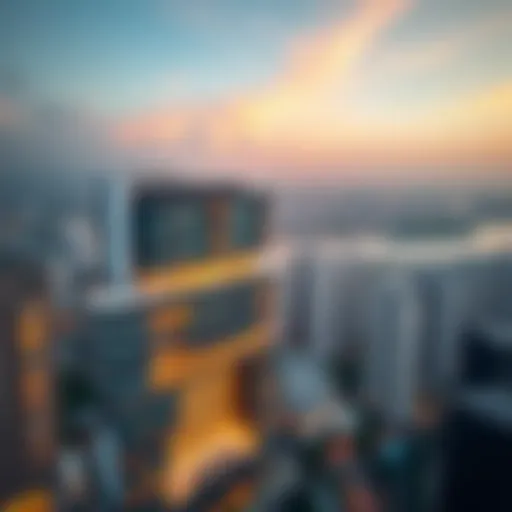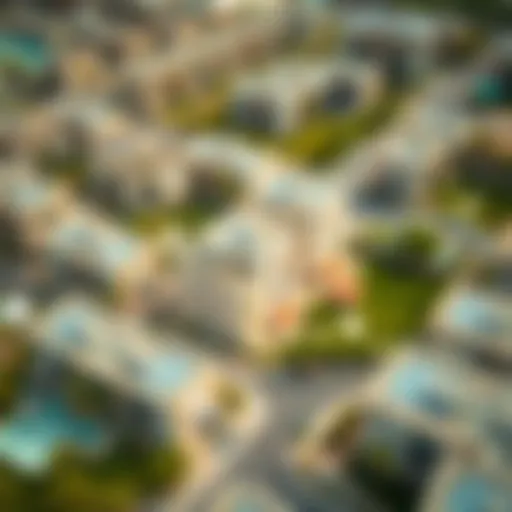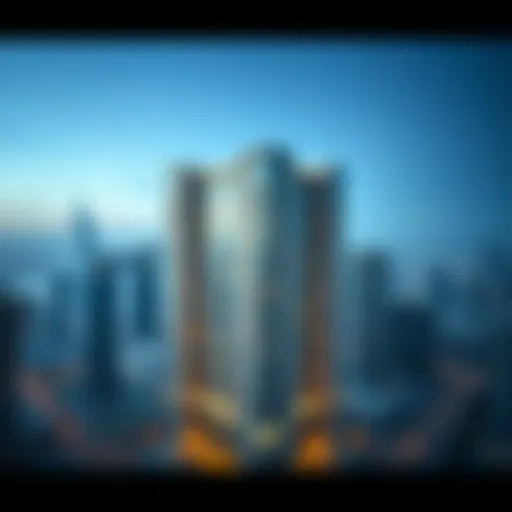Iftar and Sehri Times in Dubai for 2023


Intro
As the sun sets and the day transitions into night, a unique atmosphere blankets Dubai during the holy month of Ramadan. Iftar, the moment when fasting ends at sunset, and Sehri, the pre-dawn meal, become pivotal parts of daily life. Understanding the timings and significance of these rituals is essential not just for locals but also for visitors wanting to embrace the cultural richness of this vibrant city during Ramadan.
In 2023, the Iftar and Sehri times vary slightly each day, influenced by the lunar calendar. As such, having a comprehensive guide helps both residents and travelers align their daily schedules with these sacred traditions. But it goes beyond mere timing; it’s about unearthing the social, culinary, and religious tapestry that weaves each gathering together, making the experience more enriching.
From the bustling streets filled with the aromas of sumptuous dishes to the peaceful moments shared with family and friends, Dubai showcases an unparalleled sense of community during this month. Whether you are fasting or merely observing, an understanding of Iftar and Sehri can spotlight the heart of Ramadan, revealing the essence of togetherness and gratitude.
This guide will delve into the timing, significance, and cultural practices surrounding Iftar and Sehri in Dubai for 2023. With helpful insights into local customs and recommendations for culinary encounters, readers will gain a meaningful appreciation for these traditions. Also, as you travel through the pages, tips and pointers will be laid out for an unforgettable Ramadan experience in one of the world's most dynamic cities.
Understanding Iftar and Sehri
The rituals of Iftar and Sehri hold immense significance during the holy month of Ramadan, acting as both spiritual and social anchors for the Muslim community. This section delves into the profound importance of these practices, not just as mere acts of eating, but as integral parts of a collective and individual faith journey.
Significance of Iftar and Sehri
Iftar, marking the end of the daily fast, is a time when families and friends gather to break their fast together. This communal aspect fosters a sense of community and belonging, reflecting Islamic teachings on unity and togetherness. The evening meal often begins with the consumption of dates and water, symbolizing tradition and a moment of gratitude for the sustenance provided.
Sehri, on the other hand, is the pre-dawn meal that prepares individuals for fasting throughout the day. This meal is not merely about filling one's stomach but serves a deeper purpose—reminding one of the blessings of food and the need for a strong spirit to endure the fast ahead. The significance of Sehri is often highlighted by the urgent gendered calls to rise early, which are deeply woven into the cultural fabric of the fasting experience.
Moreover, both Iftar and Sehri signify discipline and self-restraint, inviting practitioners to reflect on their inner selves while fostering a connection to their faith. As families sit together to share their meals, they build stronger bonds, making these rituals a cornerstone of their cultural and spiritual identity.
"Fasting is not about mere abstention from food; it’s about elevation of mind, spirit, and community."
Cultural Context in Dubai
In Dubai, the cultural landscape amplifies the significance of Iftar and Sehri, intertwining local customs with broader Islamic traditions. The energy in the city shifts as Ramadan approaches. Streets are adorned with vibrant lights, and local businesses often adapt their hours to accommodate the fasting community. This is a time when the spirit of hospitality shines brightly, as both residents and visitors alike partake in a shared cultural experience.
Iftar in Dubai transforms into a communal celebration where large public feasts are organized, offering a variety of local and international dishes. From traditional Emirati cuisine such as harees and mahsheer, to modern adaptations that cater to diverse palates, there’s something for everyone.
Families often visit Ramadan tents—temporary spaces set up in various neighborhoods and hotels—where the atmosphere is lively, resonating with laughter and conversation. These tents become melting pots where intercultural exchanges occur, as residents welcome guests from all corners of the globe.
During Sehri, the focus turns inward as many seek tranquility in their homes. Some enthusiasts might find local restaurants open for this pre-dawn meal, yet for the most part, families prefer the privacy and warmth of their dining tables.
This environment transforms Dubai into a cultural microcosm during Ramadan, with trust and hospitality at its core, providing a unique backdrop for both faith-affirming practices and social engagement.
Ramadan Calendar Overview for
Understanding the Ramadan calendar is crucial for anyone looking to immerse themselves in the rich cultural tapestry of Dubai during this holy month. This year's observance encapsulates various elements, from essential dates and celebrations to the way times for Iftar and Sehri shift throughout the month. By learning about key dates in the Ramadan calendar, one can better appreciate the spiritual significance and community engagement that thrives during this period.
Key Dates and Observances
Diving into the specifics, Ramadan is anticipated to begin on the evening of March 23rd, 2023, with the precise start depending on the sighting of the moon. Key dates in the Ramadan calendar include:
- First Suhoor: March 23, 2023
- First Iftar: March 24, 2023
- Laylat al-Qadr (Night of Power): This special night is often observed on one of the odd nights in the last ten days of Ramadan, anticipated around April 19 or 21, 2023.
- Eid al-Fitr: Expected to be on April 21, 2023. It marks the end of fasting and is celebrated with great fanfare.
These dates hold immense significance, not only for worshippers but also for businesses and community gatherings. During this time, establishments often have special offerings and extended hours to accommodate the shift in daily routines. Different mosques may have their own schedules for prayers as well, so it’s wise to stay updated.
Timing Variations Across Days
Fasting lengths in Dubai are subject to change daily, presenting an interesting dynamic as the month progresses. The variation in timings is primarily influenced by the sunrise and sunset. Generally, the fast begins around 5:00 AM with Fajr prayer and ends just after 6:30 PM with Maghrib prayer. As Ramadan goes on, the duration of fasting can extend up to about 14-15 hours.
To illustrate this:
- March 24: Sehri ends at 5:10 AM, and Iftar is around 6:30 PM.
- April 14: Sehri ends at 5:00 AM, with Iftar at 6:38 PM.
Keeping track of these variations helps one manage time effectively, ensuring peaceful moments for both reflection and nutrition.
This fluctuation can seem daunting, however, it enriches the experience by reminding participants of the spiritual commitment involved. Not only does it form connections among the community, but it also cultivates patience and gratitude for the blessings of food and fellowship that occur at the day’s end.
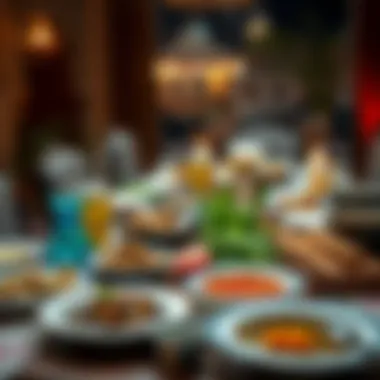

Official Iftar and Sehri Times in Dubai
The daily observance of Iftar and Sehri marks critical points in a Muslim's day during Ramadan. Knowing the precise times for each meal holds profound significance, as it shapes the eating habits, social interactions, and overall experience of fasting.
Accurate timing is not just a matter of convenience; it’s intertwined with religious adherence and community practices. In a city like Dubai, where the life is a tapestry of diverse cultures and traditions, having a clear understanding of Iftar and Sehri times is paramount. This knowledge allows residents and visitors alike to partake in communal meals, respecting the timings to foster a sense of belonging while sharing in the collective spirit of Ramadan.
It’s essential to keep abreast of the schedule, as slightly varying timings can influence the rhythm of daily life. Especially for those new to Ramadan or travelers, getting the timings right can enhance the spirituality of the month. This section will delve into the daily timings and how they fluctuate, ensuring an informed approach to celebrating these cherished moments.
Daily Timing Breakdown
Each day during Ramadan, the times for Iftar and Sehri shift slightly, dictated largely by sunset and dawn. Traditionally, Iftar is broken just after the call to Maghrib prayer, which coincides with sunset. In contrast, Sehri, the pre-dawn meal, must be consumed before Fajr, the call to prayer that marks the start of the fasting period.
In Dubai for 2023, here’s a snapshot of the Iftar and Sehri timings:
- Day 1 (March 23, 2023):
- Day 10 (April 1, 2023):
- Day 20 (April 11, 2023):
- Day 29 (April 20, 2023):
- Iftar: 6:21 PM
- Sehri: 4:54 AM
- Iftar: 6:27 PM
- Sehri: 4:47 AM
- Iftar: 6:34 PM
- Sehri: 4:40 AM
- Iftar: 6:42 PM
- Sehri: 4:27 AM
Note: The exact timings may vary slightly depending on the location within Dubai.
Adjustments Due to Seasonal Changes
As Ramadan shifts throughout the calendar year, timings for both Iftar and Sehri adjust gradually. These changes are primarily due to the Earth’s rotation and the varying lengths of daylight hours.
The longer days in the summer months mean Sehri comes earlier, while Iftar follows later. Conversely, shorter days during winter months see Sehri being enjoyed later and Iftar occurring sooner. This dynamic aspect of Ramadan not only affects meal timings but also how individuals cope with fasting and daily activities.
With the increase in heat, especially in Dubai, considerations extend beyond just time. Adequate hydration and nutritional choices become even more crucial.
A few strategies for dealing with these timing changes include:
- Planning Ahead: Mark calendars with Iftar and Sehri times. Use apps that give notifications for meal times.
- Culinary Prep: Prepare meals in advance to make full use of the limited time frame to eat.
- Hydration Strategies: Focus on hydrating during non-fasting hours, adjusting for the longer days.
As one takes part in this sacred month, understanding the nuances of timing within Ramadan enhances both the spiritual and communal experience.
Local Customs and Traditions
Local customs and traditions play a critical role during Ramadan in Dubai, incorporating both cultural and spiritual elements that enrich the experience of Iftar and Sehri. This section highlights how these practices resonate within the community and present an opportunity for social cohesion amidst diverse backgrounds.
Communal Iftar Gatherings
In Dubai, communal Iftar gatherings are an intrinsic part of Ramadan, bursting with warmth and hospitality. These events often take place in homes, mosques, and numerous public venues, fostering an atmosphere of unity and sharing. Friends, family, and even strangers come together to break their fasts after sunset, illustrating the very essence of community spirit.
One of the common sights you might be privy to in Dubai during this time is the long tables laden with an array of dishes that reflect the multicultural makeup of the city. It's not uncommon to find Arabic favorites like Harees and Shorbat Adas, alongside Indian biryanis and even Western-style salads. Each bite tells a story, a fusion of tradition and modernity, showcasing Dubai's culinary diversity.
"The act of gathering for Iftar transcends mere dining; it embodies the spirit of respect, love, and empathy among individuals."
Additionally, these gatherings often extend beyond family and friends to include less fortunate individuals in the community. Initiatives led by mosques and community centers often organize public Iftars, whereby anyone can join to enjoy the meal for free. This random acts of kindness are a vital part of Ramadan in Dubai, reflecting the deeper values of generosity and compassion.
Traditional Foods Associated with Iftar
The foods associated with Iftar in Dubai are as rich as the cultural tapestry of the city. Breaking the fast traditionally begins with dates and water, a practice instituted by the Prophet Muhammad. This offers a spiritually refreshing way to transition from a day of fasting to indulging in hearty meals.
Moreover, traditional dishes play a crucial role at Iftar tables. Some of the more popular choices include:
- Samboosa: Savory pastries filled with meat or vegetables. These crispy delights are very much a crowd favorite.
- Poodim: A warm, spiced pudding that provides comfort after a day without food.
- Kebab: Skewers of marinated meat grilled to perfection are often served, carrying with them a smoky flavor that excites the palate.
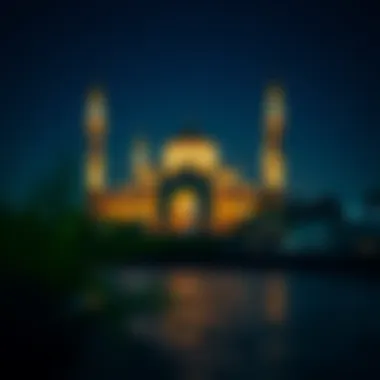

Each dish is prepared with care and intention, often served with a variety of dips and breads such as Khobz and Mujadara.
As the sun begins to set, the anticipation in the air is palpable; the local mosques commence with the adhan, the call to prayer. The rhythmic sounds signal not just a time to pray but also the cherished moment when families and friends come together around the table.
It's the intertwining of these foods, customs, and communal interactions that make the act of Iftar not just a meal, but a shared cultural moment that bridges divides and nurtures bonds in Dubai.
Practical Tips for Residents and Visitors
Understanding Iftar and Sehri practices is essential for anyone spending Ramadan in Dubai. It's not just about fasting; it’s a time steeped in community, reflection, and connection. When considering the timing of meals around the fast, both residents and visitors can greatly enhance their experience by being informed.
Planning Meals Around Iftar and Sehri Times
Timing is everything during Ramadan. If you're new to fasting, planning meals for Iftar and Sehri becomes crucial. Popularly, Sehri, or the pre-dawn meal, is taken before the Fajr prayer. Traditionally, it involves a hearty meal to sustain one throughout the day.
Given that timings shift slightly each day, here are a few practical strategies to consider:
- Make a Schedule: Keep a Ramadan calendar handy, or download an app that tracks Iftar and Sehri timings. This ensures you won’t miss vital meal times.
- Shop Efficiently: Grocery stores in Dubai can be busier than a beehive during Ramadan. Shop a few days in advance, stocking up on essentials like dates, water, and nourishing foods that fill you up.
- Meal Prep: On days when you're short on time, having meals prepped can save everyone a lot of hassle. Consider batch-cooking meals that can easily be reheated or served quickly.
Choosing the right foods is pivotal. Opt for slow-digesting carbs like oats or whole grains for Sehri, which can help sustain energy levels. Hydration is also key, so drink plenty of water during non-fasting hours.
"When you break your fast, remember that tradition is your friend. Find local favorites and share them with others. Food is a bridge between cultures."
Dining Options and Recommendations
Once the sun dips below the horizon, the city of Dubai comes alive with special Iftar offerings in restaurants, parks, and hotels. For residents and visitors alike, knowing where to eat can enhance the communal aspect of Ramadan.
- Buffets and Set Menus: Many hotels offer lavish Iftar buffets that showcase both Emirati and international cuisines. Places like the Burj Al Arab or Atlantis often see high foot traffic during Ramadan, but reservations can help ensure you have a spot.
- Local Restaurants: Explore smaller, local eateries that serve traditional fare. You might discover hidden gems that offer authentic Arabic dishes. Places like Al Ustad Special Kabab or Bait Al Mandi can provide a taste of local flavors.
- Food Trucks and Community Stalls: During Ramadan, food trucks often pop up in cultural precincts, serving quick yet delicious meals, from shawarma to falafel. These spots not only offer unique food but also a chance to mingle.
Finally, keeping an eye on social media can reveal impromptu gatherings or pop-up events. Residents should share their experiences too, as word-of-mouth recommendations often lead to unexpected culinary delights.
The Role of Hospitality in Ramadan
During Ramadan, hospitality emerges as a vital cornerstone in Dubai's cultural tapestry. It is not merely about sharing food during Iftar, but rather encompasses a broader ethic of community, generosity, and togetherness. This period invites people to welcome each other into their homes and hearts, creating an atmosphere that transcends mere dining experiences; it’s about forging connections and fostering understanding across diverse communities.
Restaurants and Hotels Providing Iftar Services
In Dubai, numerous establishments embrace the spirit of Ramadan by offering special Iftar services that cater to the diverse population of the city. Hotels and restaurants often curate lavish buffets featuring traditional dishes, but also modern culinary creations. Here are a few notable examples:
- The One&Only Royal Mirage: Known for its opulent settings and exotic menus, the hotel serves Iftar amidst stunning views of the Arabian Gulf. Each dish aims to balance authenticity and innovation, appealing to both locals and expatriates.
- Zahrat Al-Madina: A jewel in the heart of Dubai, this restaurant offers a significant blend of local flavors and Middle Eastern classics, ensuring everyone enjoys their meal while spending quality time with family and friends.
- Al Mahara: This underwater restaurant is not just about the food, it's about the entire experience. During Ramadan, they provide exquisite Iftar menus paired with stunning views of aquatic life through a massive aquarium.
With options ranging from intimate settings to bustling communal dining, these venues serve not just meals, but create memorable experiences. While traditional dishes are plentiful, the emphasis on freshness and health remains, encouraging patrons to enjoy hearty meals in moderation.
Rituals of Generosity and Sharing
Generosity and sharing are cornerstones of Ramadan, prevalent in both public and private spheres. The notion of giving is elevated, promoting a culture of kindness. Families often invite friends and neighbors over for Iftar, breaking bread together and exchanging stories, which enhances communal bonds. This spirit of sharing extends beyond simple meals; it is about being inclusive.
Many organizations organize events centered on charity, where food is distributed to those in need, reinforcing the principles of compassion and empathy. During this time, you might see:
- Community Iftars: Open to all, these communal gatherings welcome anyone to partake, regardless of background. They serve as a reminder of the unity that Ramadan fosters.
- Food Drives: Local charities often request food donations, and many families step up, contributing whatever they can to ensure everyone has a full stomach at the end of the day.
- Hospitality Initiatives: Several hotels embark on initiatives to host people who may be away from their families during Ramadan, providing a warm meal and an opportunity to meet others.
"During Ramadan, we do not just prepare food; we prepare a space for connection, for understanding, and for humanity to thrive."
In summary, the role of hospitality in Ramadan extends beyond serving meals; it enhances social cohesion and uplifts the spirit of community, making this holy month a truly remarkable experience for all involved.
Health Considerations During Ramadan
Observing Ramadan brings several spiritual benefits and social connections, but one should not overlook the importance of maintaining health during this holy month. Adhering to fasting practices demands a thorough understanding of how to nourish the body adequately during the hours one is permitted to eat. Insufficient nutritional resources can lead to fatigue, dehydration, and other health concerns, which, in turn, can detract from the overall spiritual experience of Ramadan. Hence, it’s vital to execute a well-planned approach to health and nutrition.
Nutritional Balance During Fasting
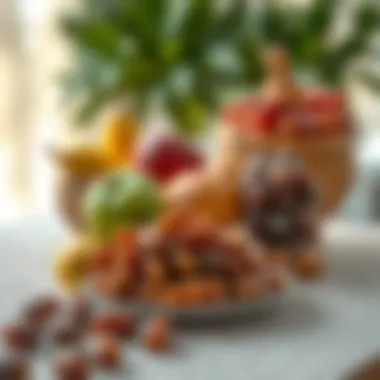

Achieving nutritional balance while fasting necessitates conscious choices during Iftar and Sehri. After a long day of abstaining from food and drink, the Iftar meal plays a pivotal role in replenishing depleted energy and nutrients. But it’s not just about filling the plate; quality matters. A meal composed of balanced macronutrients—carbohydrates, proteins, and fats—fuels the body effectively.
- Carbohydrates: Opt for complex carbohydrates such as whole grains, lentils, and legumes. They digest slowly and keep energy levels consistent.
- Protein: Including lean protein sources, such as chicken, fish, or legumes, can aid in muscle repair and sustenance.
- Fruits and vegetables: These are crucial for providing vital vitamins and minerals essential for immune function.
An example of a balanced Iftar plate could include grilled chicken, brown rice, and a side of mixed vegetables topped with a light olive oil dressing. It’s also wise to start with dates and water to ease the stomach into digestion.
Hydration Strategies for the Fast
Hydration during the non-fasting hours is key. While fasting, one might not feel thirsty, but it's critical to drink water consistently between Iftar and Sehri to prevent dehydration. After all, losing track of water intake can certainly sneak up on you by the time Suhoor is over.
- Set a Schedule: Plan to drink water at regular intervals. Consider aiming for at least eight to ten cups by the time Sehri is done. Dividing this across your available hours makes it more manageable.
- Avoid Dehydrating Beverages: Try to steer clear of caffeinated drinks, like coffee and black tea, because they can dehydrate you. Instead, herbal teas or simply flavored water can be refreshing alternatives.
- Fruits with High Water Content: Incorporating fruits like watermelon, cucumbers, and oranges into your meals can also augment hydration while providing additional nutrients.
Remember, hydrating properly can help you feel more energetic and focused. A lack of water can lead to headaches, dizziness, and fatigue, which can overshadow your Ramadan experience.
Ensuring that one maintains proper health practices during Ramadan cannot be overstated. A well-thought-out strategy to handle nutrition and hydration can elevate not only physical well-being but also deepen the spiritual observance of this significant month.
Community Events and Activities
Community events during Ramadan are a crucial thread in the rich tapestry of Dubai’s cultural and social landscape. These gatherings not only foster a sense of togetherness among residents and visitors, but they also play a vital role in reinforcing the spirit of generosity, reflection, and unity that the month embodies. Residents come together to share their experiences, celebrate traditional practices, and partake in social initiatives that benefit the broader community.
Cultural Festivals During Ramadan
Cultural festivals during Ramadan in Dubai are vibrant and multifaceted, bringing together the diverse communities that populate the city. Events span from art exhibitions to music performances, allowing individuals to experience various cultural expressions that resonate with the spirit of Ramadan.
One notable festival is the Dubai Ramadan Nights, where local artists showcase their talents through performances and exhibitions. These events are held in various locations, including parks and malls, creating an inclusive atmosphere where families can enjoy arts and crafts while indulging in traditional cuisine.
Another event to highlight is the Ramadan Market at Dubai Mall. This market transforms into a bustling hub featuring food stalls, cultural displays, and live entertainment. Visitors can explore different cuisines that reflect Dubai’s melting pot of cultures while shopping for handicrafts and gifts.
For instance, the Ramadan Night Market, usually running throughout the month, offers a chance for local entrepreneurs to present their products, from handmade crafts to gourmet delicacies. Such initiatives are prime examples of how cultural festivals during Ramadan contribute not just to the local economy but also to the cultural richness of the region.
Charitable Initiatives and Volunteer Opportunities
The ethos of Ramadan strongly emphasizes charity and volunteerism. In Dubai, various charitable initiatives rise to the forefront during this month, inviting everyone to get involved, irrespective of their background. This time of year reveals the generosity intrinsic to the city’s residents, who often go above and beyond to support those in need.
One prominent example is the Iftar meal distributions organized by communities and local non-profits. These initiatives aim to provide meals to the less fortunate, ensuring that no one breaks their fast alone. Volunteers typically gather to help prepare and distribute these meals, creating a sense of community spirit and shared purpose.
Beyond meal distributions, organizations like the Dubai Cares mobilize volunteers to engage in educational projects aimed at underprivileged children in the region. This initiative highlights the significance of giving back and encourages residents to find fulfillment through altruism during Ramadan.
Involvement in charitable events allows individuals to create concrete positive impacts while fostering connections within the community. It’s an enriching experience that often draws people closer, not just during Ramadan, but throughout the year.
These charitable opportunities can also extend beyond food and education. Regular blood donation drives and fundraising efforts for local causes see a surge in participation during Ramadan, as the focus shifts towards community welfare and collective responsibility.
In a dolly of interconnectedness, these events and volunteer opportunities during Ramadan not only beautify the city but also weave a stronger narrative of care, hope, and resilience for those who partake in them.
Looking Ahead: Future Trends in Ramadan Observance
The observance of Ramadan, particularly in a hub like Dubai, is as dynamic as the city itself. As the world evolves politically, socially, and technologically, so too does the way people celebrate and engage with Ramadan. It's important to note these shifts not only to appreciate how they enrich the experience but also to anticipate potential changes that might affect local traditions.
Evolving Practices in a Globalized World
In a world that's becoming increasingly interconnected, the practices surrounding Ramadan are being influenced by various cultural exchanges. Individuals from diverse backgrounds are now residing in Dubai, and each brings unique customs. This blend creates a rich tapestry of celebrations that honors traditional values while inviting innovation.
Take for example the cuisine offered during Iftar. Not only do you find traditional dishes like dates and pakoras, but also contemporary fare tailored to fit global palates. Restaurants that once served only classic Emirati meals are now adding international options to their menu, catering to the expatriate community while still respecting the spirit of Ramadan. This cross-pollination is not merely a culinary delight but reflects a broader trend of inclusivity and cooperation among different cultures.
As Dubai continues to grow as a melting pot, it may see more events and activities that cater to various communities during this holy month. We may witness initiatives that highlight traditional practices alongside modern interpretations, promoting understanding and respect among diverse groups.
Impact of Technology on Traditional Rituals
The role of technology during Ramadan is hard to overlook. In a city that prides itself on innovation, how residents observe Iftar and Sehri is being transformed by various tech advancements. From apps that track prayer times to online platforms that host Iftar gatherings, technology is paving new paths for enhanced communal experiences.
Smartphone applications are increasingly popular, offering fast and accurate Iftar timing based on geographical location. This ensures everyone is on the same wavelength when breaking their fast, particularly in an extended urban area such as Dubai. Additionally, social media platforms enable users to share their Iftar experiences with friends and families virtually. This not only strengthens bonds but also creates a sense of shared community, regardless of physical distance.
"Technology has the potential to amplify the communal spirit of Ramadan, connecting people in ways that transcend physical boundaries."
As people strive to balance traditional observances with modern life, it's crucial to embrace these technological tools while staying grounded in the essence of Ramadan. This balance will likely shape future practices, enabling a seamless blend of the old and the new.
In summary, the future of Ramadan observance in Dubai is poised to be shaped significantly by cultural globalization and technological advancements. The interplay of tradition and modernity will define how communities come together in celebration while honoring the core values of this sacred month.

